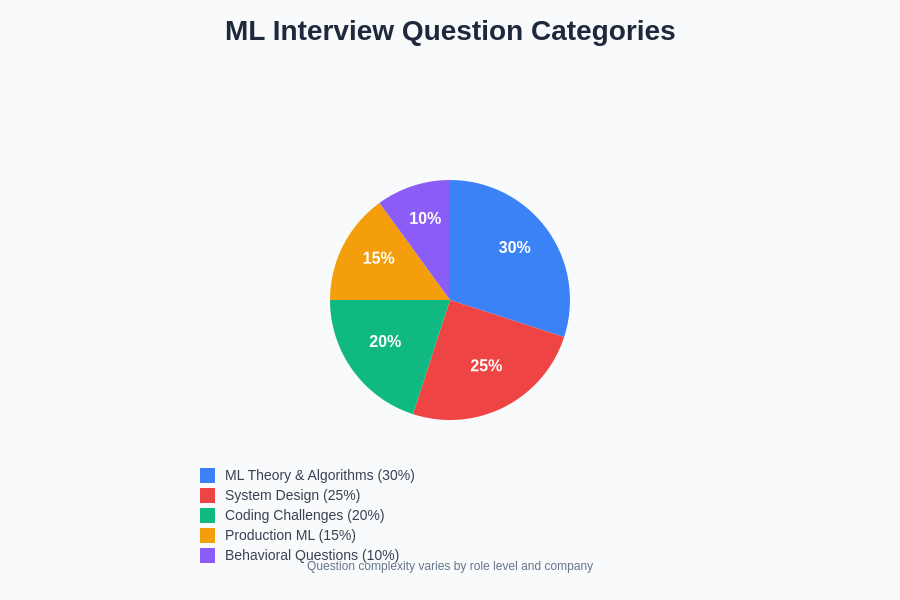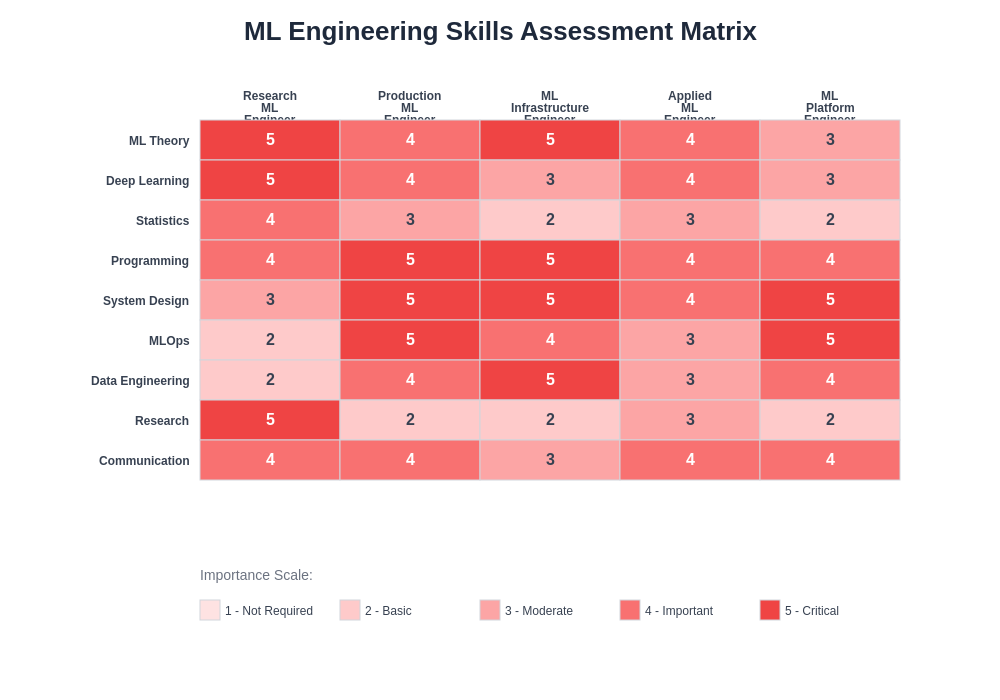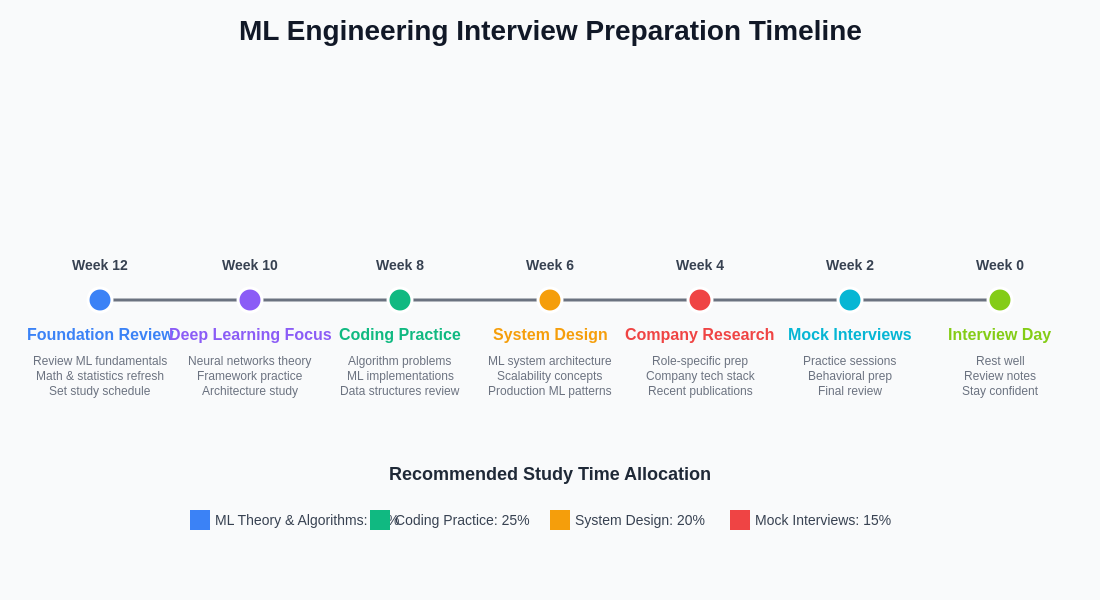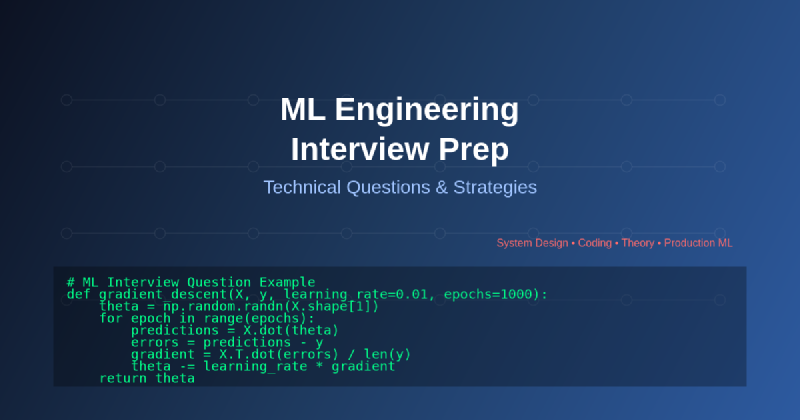The machine learning engineering landscape has evolved dramatically, creating a specialized field that bridges the gap between research and production systems. As organizations increasingly rely on AI-driven solutions, the demand for skilled ML engineers has skyrocketed, making interview preparation more critical than ever. Success in ML engineering interviews requires a unique combination of theoretical knowledge, practical coding skills, system design expertise, and deep understanding of production ML challenges that distinguish these roles from traditional software engineering or data science positions.
Stay updated with the latest AI career trends and opportunities to understand the evolving requirements and expectations in the rapidly changing machine learning job market. The complexity of modern ML engineering roles demands comprehensive preparation that covers everything from fundamental algorithms to distributed systems architecture and real-world deployment scenarios.
Understanding the ML Engineering Interview Landscape
Machine learning engineering interviews typically follow a multi-stage process that evaluates candidates across diverse competency areas. Unlike traditional software engineering interviews that focus primarily on algorithmic problem-solving, ML engineering assessments encompass machine learning theory, statistical foundations, system design principles, coding proficiency, and practical experience with production ML systems. The interview process often includes technical screening calls, coding challenges, system design discussions, and behavioral interviews that assess cultural fit and leadership potential.
The role of an ML engineer varies significantly across organizations, ranging from research-focused positions that require deep theoretical knowledge to infrastructure-heavy roles that emphasize scalability and reliability. Understanding the specific requirements of the target role is crucial for effective preparation, as companies like Google, Meta, and Netflix have vastly different expectations for their ML engineering positions. Some organizations prioritize research publications and novel algorithm development, while others focus on production system optimization and operational excellence.
Fundamental Machine Learning Theory Questions
Technical interviews for ML engineering roles invariably begin with foundational concepts that test understanding of core machine learning principles. Candidates should expect detailed discussions about supervised versus unsupervised learning paradigms, the bias-variance tradeoff, overfitting and regularization techniques, cross-validation strategies, and evaluation metrics for different problem types. These conversations often evolve into deeper explorations of specific algorithms, their mathematical foundations, computational complexity, and appropriate use cases.
Questions about gradient descent optimization frequently appear in interviews, requiring candidates to explain different variants like stochastic gradient descent, mini-batch gradient descent, and advanced optimizers such as Adam and RMSprop. Interviewers often probe understanding of learning rate scheduling, convergence criteria, and the challenges of training deep neural networks including vanishing and exploding gradients. The ability to derive gradient descent updates for simple models like linear regression demonstrates both mathematical competency and practical understanding of optimization principles.
Enhance your ML engineering skills with advanced AI tools like Claude that can help you understand complex algorithms, debug models, and optimize your interview preparation strategy through personalized learning experiences. The integration of AI assistants into your study routine can significantly accelerate comprehension of challenging concepts and provide immediate feedback on your problem-solving approaches.
Deep Learning Architecture and Implementation
Modern ML engineering roles heavily emphasize deep learning systems, making architecture knowledge essential for interview success. Candidates must demonstrate understanding of fundamental neural network components including activation functions, layer types, initialization strategies, and normalization techniques. Discussions often cover convolutional neural networks for computer vision tasks, recurrent networks for sequential data, transformer architectures for natural language processing, and generative models including GANs and VAEs.
Implementation questions frequently require candidates to code neural network components from scratch using frameworks like PyTorch or TensorFlow. These exercises test both theoretical understanding and practical programming skills, often involving custom layer implementations, loss function definitions, or training loop optimization. Interviewers may ask about memory management in deep learning, gradient accumulation strategies, mixed precision training, and distributed training approaches for large-scale models.
The emergence of large language models has introduced new categories of questions focused on attention mechanisms, positional encoding, layer normalization, and scaling laws. Candidates should understand the architectural innovations that enabled models like GPT and BERT, including multi-head attention, feedforward networks, and residual connections. Knowledge of recent developments like retrieval-augmented generation, instruction tuning, and reinforcement learning from human feedback demonstrates staying current with rapidly evolving field developments.

Understanding the distribution and complexity of different question categories helps candidates allocate study time effectively and identify areas requiring additional focus. The interconnected nature of these topics means that weakness in foundational areas can impact performance across multiple interview segments.
System Design for Machine Learning Applications
ML system design interviews evaluate candidates’ ability to architect end-to-end machine learning solutions that operate reliably at scale. These discussions typically begin with problem definition and requirement gathering, progressing through data pipeline design, model selection and training infrastructure, serving architecture, monitoring systems, and operational considerations. Candidates must demonstrate understanding of the unique challenges that distinguish ML systems from traditional software applications.
Data pipeline design questions explore ingestion strategies, feature engineering approaches, data validation techniques, and storage solutions for different data types and volumes. Interviewers often inquire about handling streaming versus batch data, managing data quality issues, implementing feature stores, and ensuring data lineage tracking. The discussion may extend to privacy considerations, regulatory compliance, and data governance frameworks that impact ML system architecture decisions.
Model serving architecture represents another critical area where candidates must balance latency requirements, throughput demands, cost constraints, and reliability expectations. Topics include online versus offline serving patterns, caching strategies, A/B testing infrastructure, model versioning systems, and canary deployment approaches. Advanced discussions may cover multi-model serving, edge deployment scenarios, and optimization techniques for reducing inference latency while maintaining prediction quality.
Coding Challenges and Algorithm Implementation
Programming assessments in ML engineering interviews typically combine algorithmic problem-solving with domain-specific implementation challenges. Standard data structures and algorithms questions remain relevant, but they often include ML-specific variations that test understanding of both computer science fundamentals and machine learning concepts. Candidates should prepare for problems involving matrix operations, statistical computations, optimization algorithms, and data manipulation tasks commonly encountered in ML workflows.
Implementation challenges frequently require coding machine learning algorithms from scratch, demonstrating both theoretical understanding and practical programming skills. Common exercises include implementing linear regression with gradient descent, k-means clustering, decision trees, or neural network components. These problems test ability to translate mathematical concepts into efficient code while handling edge cases, numerical stability issues, and performance optimization considerations.
Data manipulation and feature engineering problems assess practical skills required for real-world ML projects. These challenges might involve time series processing, text preprocessing, image transformations, or handling missing data scenarios. Candidates should demonstrate proficiency with relevant libraries like NumPy, Pandas, and scikit-learn while writing clean, efficient code that follows software engineering best practices including proper error handling and documentation.
Leverage research capabilities with tools like Perplexity to stay informed about the latest ML engineering techniques, algorithm improvements, and industry best practices that can set you apart in competitive interview scenarios. Continuous learning and staying updated with cutting-edge developments demonstrates the intellectual curiosity and adaptability essential for ML engineering success.
Production ML System Challenges
Production machine learning systems face unique challenges that distinguish them from research environments or prototype implementations. Interview discussions often focus on model deployment strategies, including containerization approaches, orchestration platforms, and continuous integration pipelines specifically designed for ML workflows. Candidates must understand the complexities of managing model dependencies, ensuring reproducibility, and handling the intersection of code changes and model updates in production environments.
Monitoring and observability represent critical aspects of production ML systems that frequently appear in technical interviews. Topics include data drift detection, model performance degradation, feature distribution monitoring, and alerting strategies for ML-specific failure modes. Candidates should understand the difference between traditional software monitoring and ML system monitoring, including metrics like prediction accuracy trends, input data quality measurements, and resource utilization patterns specific to inference workloads.
Scalability challenges in ML systems encompass both computational and operational dimensions. Discussions may cover horizontal scaling strategies for training and inference, load balancing approaches for model serving, caching mechanisms for feature computation, and optimization techniques for reducing computational costs. Advanced topics might include federated learning implementations, edge computing deployments, and strategies for handling seasonal traffic patterns or viral content scenarios that create sudden demand spikes.
Model Evaluation and Experimentation
Rigorous model evaluation methodologies form the foundation of reliable ML systems, making this topic essential for ML engineering interviews. Candidates must demonstrate understanding of appropriate evaluation metrics for different problem types, including classification metrics like precision, recall, and F1-score, regression metrics such as MAE and RMSE, and specialized metrics for ranking, recommendation, and generation tasks. The discussion often extends to trade-offs between different metrics and their business implications.
Experimental design principles become crucial when evaluating model improvements or comparing different approaches. Topics include proper train-validation-test splits, cross-validation strategies, statistical significance testing, and power analysis for determining experiment duration and sample sizes. Candidates should understand common pitfalls in ML experimentation such as data leakage, selection bias, and temporal dependencies that can invalidate experimental results.
A/B testing frameworks for ML systems require special consideration due to the complexity of measuring long-term effects and handling network effects. Interview discussions may cover experiment design for recommendation systems, search algorithms, or content ranking models where user behavior changes can impact the validity of traditional A/B testing assumptions. Understanding multi-armed bandit approaches, sequential testing methods, and techniques for measuring indirect effects demonstrates advanced experimentation expertise.

The competency matrix illustrates the multidimensional nature of ML engineering skills and helps candidates understand the relative importance of different skill areas for various types of ML engineering positions. Targeted preparation based on role requirements maximizes interview success probability.
Advanced Topics and Emerging Trends
Cutting-edge developments in machine learning continuously reshape the field, making awareness of emerging trends essential for senior ML engineering positions. Large language model deployment and fine-tuning strategies have become increasingly important, with interviews often covering topics like parameter-efficient fine-tuning, prompt engineering, retrieval-augmented generation, and the operational challenges of serving billion-parameter models in production environments.
MLOps and ML platform engineering represent rapidly growing specializations within ML engineering that focus on infrastructure, automation, and tooling. Candidates may encounter questions about feature stores, model registries, experiment tracking systems, and automated ML pipeline orchestration. Understanding the principles behind tools like MLflow, Kubeflow, and various cloud-native ML platforms demonstrates familiarity with modern ML infrastructure approaches.
Responsible AI and ML ethics considerations have gained prominence in interview discussions, particularly for senior roles where candidates may influence system design decisions with societal impact. Topics include bias detection and mitigation strategies, fairness metrics, explainability techniques, and privacy-preserving ML approaches like differential privacy and federated learning. Understanding regulatory compliance requirements and the business implications of responsible AI practices reflects the maturity expected in senior engineering roles.
Behavioral Questions and Leadership Assessment
Technical competency alone is insufficient for senior ML engineering positions, making behavioral interviews critical components of the assessment process. Questions typically explore past project experiences, focusing on technical leadership, cross-functional collaboration, and problem-solving approaches in ambiguous situations. Candidates should prepare specific examples that demonstrate impact, including quantifiable improvements to model performance, system efficiency, or business metrics achieved through their technical contributions.
Communication skills receive particular attention in ML engineering interviews due to the need to explain complex technical concepts to diverse stakeholders including product managers, executives, and engineering teams from different domains. Interviewers may present scenarios requiring candidates to explain technical trade-offs, justify architectural decisions, or present experimental results to non-technical audiences. The ability to translate technical complexity into business value propositions often distinguishes successful candidates from those with purely technical focus.
Leadership and mentorship capabilities become increasingly important for senior ML engineering roles, with questions exploring experiences guiding junior engineers, influencing technical direction, and driving organizational change. Topics may include experiences with code reviews, technical design discussions, hiring and interview participation, and contributions to engineering culture and best practices. Demonstrating growth mindset, continuous learning, and adaptability to rapidly evolving technical landscapes reflects the qualities essential for long-term success in ML engineering careers.
Interview Strategy and Preparation Tips
Effective ML engineering interview preparation requires systematic approach that balances theoretical study, practical coding practice, and system design exercises. Candidates should allocate time across different competency areas based on the specific role requirements and their existing strengths and weaknesses. Creating a structured study plan with regular progress assessments helps ensure comprehensive coverage of essential topics while identifying areas requiring additional focus.
Mock interviews with experienced ML engineers provide invaluable preparation opportunities that simulate real interview conditions and pressure. These sessions help candidates practice explaining technical concepts clearly, thinking through complex problems methodically, and managing time effectively during coding challenges. Feedback from mock interviews often reveals communication gaps, technical blind spots, or presentation issues that might not be apparent through self-study alone.
Building a portfolio of relevant projects demonstrates practical experience and provides concrete examples for behavioral interview discussions. Successful projects might include end-to-end ML systems, novel algorithm implementations, significant performance optimizations, or contributions to open-source ML frameworks. Documenting these projects thoroughly, including technical challenges encountered and solutions developed, creates valuable talking points that distinguish candidates from those with purely academic or theoretical backgrounds.

A structured preparation timeline ensures comprehensive coverage of all essential topics while allowing sufficient time for practice and refinement. The timeline should be customized based on individual backgrounds, target roles, and available preparation time before interview processes begin.
Company-Specific Preparation Strategies
Different organizations have distinct ML engineering cultures, technical stacks, and interview styles that require tailored preparation approaches. Technology giants like Google, Meta, and Amazon typically emphasize algorithmic problem-solving, system design capabilities, and experience with large-scale distributed systems. Their interviews often include coding challenges that combine traditional algorithms with ML-specific problems, system design questions focused on scalability and reliability, and deep technical discussions about optimization and performance.
Startups and smaller companies may prioritize practical experience, versatility, and ability to work independently on diverse problems. Their interviews might focus more heavily on real-world ML project experience, ability to work with limited resources and data, and demonstrated impact on business metrics. Candidates should prepare examples of end-to-end project ownership, creative problem-solving with constraints, and ability to make pragmatic technical decisions in uncertain environments.
Research-oriented organizations like OpenAI, DeepMind, or research labs within larger companies typically emphasize theoretical knowledge, publication record, and ability to contribute to novel algorithm development. Their interviews may include detailed discussions of recent papers, mathematical derivations, experimental design, and research methodology. Candidates should prepare to discuss their research contributions, theoretical insights, and ability to translate research ideas into practical implementations.
Understanding the specific technical challenges and business priorities of target organizations enables more focused preparation and demonstrates genuine interest in the role. Researching recent publications, engineering blog posts, and technical talks from company employees provides insights into their current focus areas and preferred approaches to ML engineering challenges.
Career Development and Continuous Learning
Machine learning engineering represents a rapidly evolving field where continuous learning and skill development are essential for long-term career success. The interview process serves not only as an assessment mechanism but also as a learning opportunity that exposes candidates to new concepts, different approaches to familiar problems, and insights into industry best practices. Maintaining curiosity and growth mindset throughout the interview process reflects the adaptability required for thriving in dynamic ML engineering environments.
Professional development in ML engineering benefits from diverse learning sources including academic research, industry publications, open-source contributions, and community engagement. Following key researchers and practitioners on platforms like Twitter, LinkedIn, and GitHub provides exposure to cutting-edge developments and practical insights from experienced professionals. Participating in ML engineering communities, attending conferences, and contributing to discussions helps build professional networks and stay informed about industry trends.
The intersection of ML engineering with other disciplines continues to expand, creating opportunities for specialization in areas like MLOps, ML infrastructure, responsible AI, or domain-specific applications in healthcare, finance, or autonomous systems. Understanding these emerging specializations and their requirements helps guide career development decisions and identifies areas for skill development that align with personal interests and market demand.
The future of ML engineering promises continued evolution as the field matures and new challenges emerge from the deployment of increasingly sophisticated AI systems. Successful ML engineers will need to balance deep technical expertise with broader skills in communication, leadership, and ethical decision-making as AI systems become more integral to business operations and societal infrastructure.
Disclaimer
This article is for informational purposes only and does not constitute professional career advice. The views expressed are based on current understanding of ML engineering interview practices and industry trends. Interview processes vary significantly across organizations, and candidates should research specific company requirements and adapt their preparation accordingly. Success in ML engineering interviews depends on multiple factors including technical preparation, communication skills, cultural fit, and alignment with specific role requirements.
